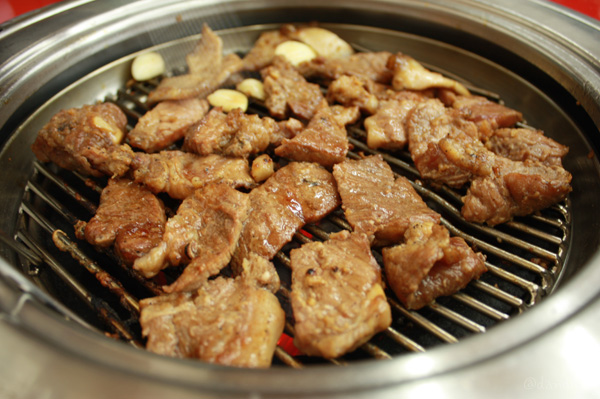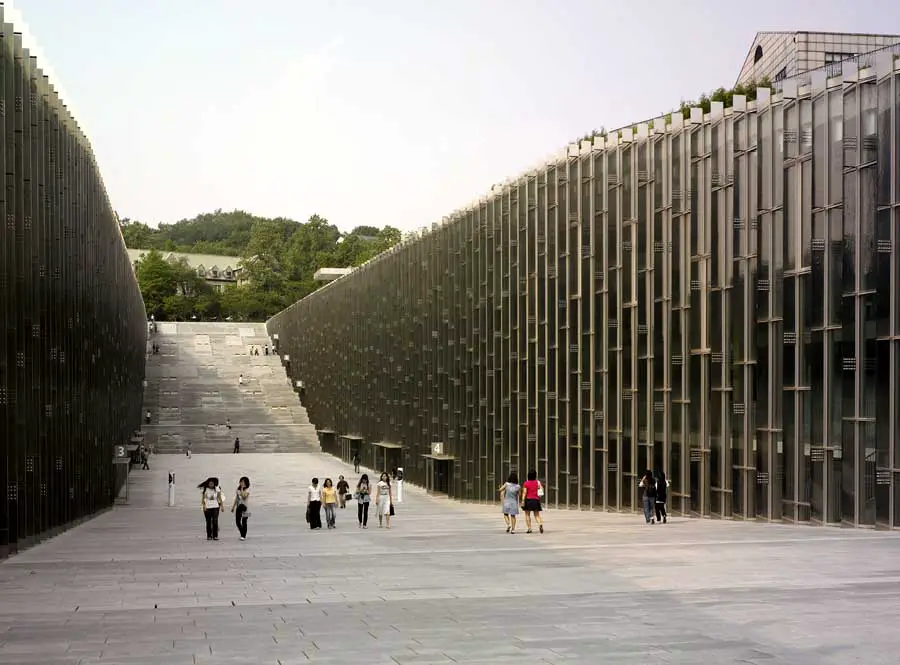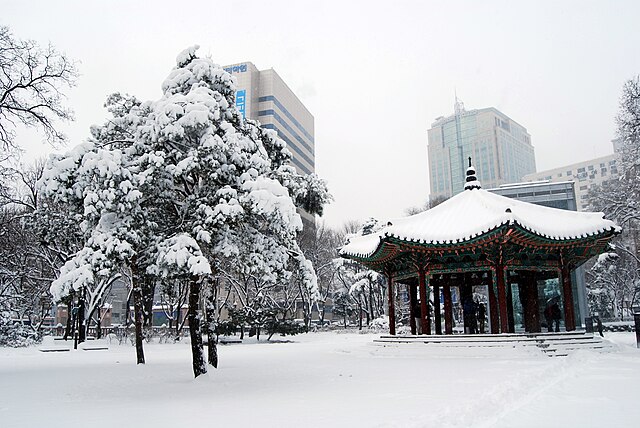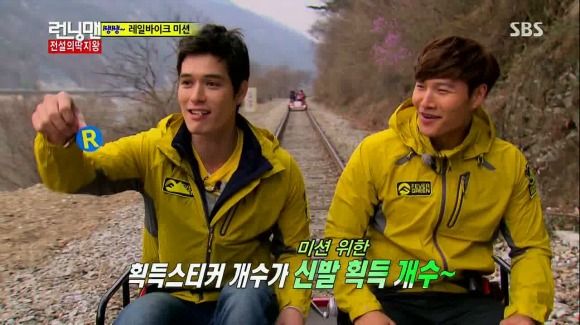The "W"s in Korean #
The "W"s in Korean Who 누구(nugu) What 뭐(mwo) Where 어디(eo-di) When 언제(eon-je) Why 왜(wae) Which 어느(eoneu) How 어떻게(eotteohge) Example: Who is that guy? 저 남자는 누구예요? (jeo namjaneun nuguyeyo?) What are you doing tonight? 오늘 밤 뭐해요? (oneul bam mwohaeyo?) Where are you now? 지금 어디 있어요? (jigeum eodi iss-eoyo?) When is the bus coming? 버스는 언제 오는 거예요?(beoseuneun eonje oneun geoyeyo?) How can you do this to me? 어떻게 나한테 이럴 수가 있어? (eotteohge nahante ileol suga iss-eo) Why are you crying? 왜 울어요? (wae ul-eoyo?) Which country you're from? 어느 나라 사람 이에요? (eoneu nara saram ieyo?) 언제(eon-je) also can be transformed into 언제나(eon-je-na) - always, whenever. I'll always be by your side. 언제나 네 옆에 있을게 (eonjena ne yeop-e iss-eulge) 누구(nugu) also can be transformed into 누가(nu-ga)- who/someone Who came? 누가 왔어요? (nuga wass-eoyo?) Happy Halloween Everyone! 여러분 해피 할로윈!
Image credit, Home & Garden Television
Labels: Hangul Wednesday, 31 October 2012 | 0 comment[s] | back to topFood-related words in Korean #
Hungry? Here's some Korean words you must learn.
Korean barbeque. Image credit: http://aramoon.tistory.com
Breakfast 아침 식사 (achim sigsa) Lunch 점심(jeom-sim) Dinner 저녁(jeo-nyeog) Supper / late night snack 야식(ya-sig) Restaurant 식당(sig-dang) Rice 밥(bab) Water 물(mul) Chicken(meat) 닭고기(dalg-gogi) Beef(meat) 소고기(so-gogi) Pork(meat) 돼지 고기(dwaejigogi) Kimchi soup/stew 김치찌개 (gimchi jjigae) Soju(alcohol) 소주(soju) Hungry 배고파(bae-go-pa) Full 배불러(bae-bul-leo) Is it yummy? 맛있어요?(mas-iss-eoyo) Yes, yummy. 네, 맛있어요(mas-iss-eoyo) Eat more 많이 드세요 (manh-i deuseyo) / 많이 먹어요(manh-i meog-eoyo) Enjoy your food 맛있게 먹어요(mas-issge meog-eoyo) I ate well / I enjoyed the meal. 잘 먹었어요(jalmeog-eoss-eoyo) Example: Today I ate lunch with a friend. 오늘 친구랑 점심 먹었어요(oneul chingulang jeomsim meog-eoss-eoyo) Let's eat dinner together? 저녁 같이 먹을래? (jeonyeog gat-i meog-eullae?) I feel like eating Kimchi stew. 김치찌개 먹고 싶어요(gimchijjigae meoggo sip-eoyo) Give me beef(meat) please. 소고기 주세요(so-gogi ju saeyo) What's your favourite Korean food? :) Tuesday, 30 October 2012 | 0 comment[s] | back to topSchool Stuff #
Words that are related to school.
Hanyang University, Seoul
School 학교(haggyo) (generally we use this) Elementary school 초등학교(chodeunghaggyo) High school 고등학교 (godeunghaggyo) University 대학교 (daehaggyo) Class 수업(sueob) Teacher 선생님(seonsaengnim) Professor 교수님(gyosunim) Student 학생(hagsaeng) Homework 숙제(sugje) Book 책 (chaeg) Study 공부(gongbu) Exam 시험(siheom) Holiday 방학(banghag) Recess 휴식시간(hyusigsigan) Example: There's English exam tomorrow. 내일 영어시험이 있어요(naeil yeong-eosiheom-i iss-eoyo) There is so many homework today. 오늘은 많이 숙제 있어요(oneul-eun manh-i sugje iss-eoyo) I can't go to school tomorrow. 저 내일 학교못가요 (jeo naeil haggyomotgayo) Study hard 열심히 공부해요 (yeolsimhi gongbuhaeyo) I don't want go to school. 나 학교 가기 싫어요 (na haggyo gagi silh-eoyo)
Amazing architecture at Ewha University, image credit: e-architect.co.uk
Some famous universities in Korea. 1. Hanyang University 2. Yonsei University 3. Hongyik University 4. Chonnam University 5. DongSeo University 6. Kyung Hee University 7. Ewha University 8. Inje University Labels: Hangul Monday, 29 October 2012 | 0 comment[s] | back to topCommon Phrases #
OMG / Oh My Goodness 아이고 (aigo) Oh Gosh 어머 (eomeo) but you can pronounce it as omo. Faster 빨리 (ppali) Damn 아이씨 (aishi) Big win / great success 대박(daebak) The best / awesome 짱(jjang) Fighting 화이팅 (hwating)/ 파이팅 (paiting) Our/We/My 우리(uri) It literally means "ours", but Korean always use it as "my". Annoying 짜증나 (jjajeungna) Really 진짜(jinjja) / 정말 (jeongmal) Alot/Much 너무(neomu) You're in big trouble! 큰일 났다! (keun-il nassda!) What? 뭐야(mwoya) Crazy guy 미친놈(michinom) This is abit rude, though :) Nonsense/Ridiculous 말도 안돼 (maldo andwae) Example: Our house/My house is too far. 우리 집이 너무 멀어요 (uri jib-i neomu meol-eoyo) Our/My oppa is the best. 우리 오빠 짱! (uri oppa jjang!) Our/My mother is a doctor. 우리 어머니 의사에요 (uri eomeoni uisa-eyo) Oh, it's so cute! 어머 진짜 귀여워요! (eomeo jinjja gwiyeowoyo!) What nonsense are you talking about? 이게 무슨 말도 안되는 소리야 ? (ige museun maldo andoeneun soriya ?) This flower is so pretty. 이꽃이 너무 예뻐요(ikkoch-i neomu yeppeoyo) Any other common Korean words that you could think of? Labels: Hangul, kpop, South Korea Sunday, 28 October 2012 | 2 comment[s] | back to topFormal and Informal #
This is very important when you're learning Korean language. It's one of the basics too. You have to/must speak in formal/honorific when you're talking to an elder person(teacher, senior, grandparents/parents, ministers) or someone you just met or to show politeness. Formal Sentences that ends with 1. 이에요 (i-e-yo) 2. 예요 (ye-yo) 3. 요(yo) 4. 입니다 (ibnida) 5. 있습니다 (issseubnida) 6. 입니까 (ibnikka) 7. 이겠습니다 (igessseubnida) 8. 이겠어요 (igess-eoyo) 9. 하세요 (haseyo) In formal form, suffix -님(nim) to address someone. 아버지(abeoji) → 아버님(abeo-nim) (father) 어머니(eomeoni) → 어머님(eomeo-nim) (mother) 형(hyung) → 형님(hyung-nim) (brother) 선생님 (seonsaengnim) (teacher) -씨(ssi) is added to a person name, in formal form. Usually with one's full name or the given name without the first name. But attaching -씨 to first name/surname, is quite rude. Example: 장근석씨(jang-geunseogssi) - Mr. Jang Keun Suk or 근석씨(geunseogssi) - Mr Keun Suk Pronouns I/my/myself Formal: 저(jeo),제(je) Informal: 나 (na), 내(nae), 난(nan) You/yours Formal: 당신(dangsin) Informal: 너(neo), 네(ne), 넌(neon) Usually informal, 반말(banmal) is spoken to family members or close friends only. Informal 1. 이다 (i-da) 2. 이겠다 (igessda) 3. 이냐 (i-nya) 4. 였다 (yeossda) 5. 이겠느냐 (igessneunya) 6. 야 (ya) Example: The following sentences are informal first, then follow by formal form. Mr. Jang Keun Suk is so cool/handsome. 장근석씨 너무 멋있다(jang-geunseogssi neomu meos-issda) 장근석씨 너무 멋있어요(jang-geunseogssi neomu meos-iss-eoyo) It rained today. 오늘은 비가 왔어(oneul-eun biga wass-eo) 오늘은 비가 왔어요(oneul-eun biga wass-eoyo) I want to watch drama. 드라마 보고싶다(deulama bogosipda) 드라마 보고싶어요(deulama bogosip-eoyo) My head hurts! 머리 너무 아파!(meoli neomu apa!) 머리 너무 아파요!(meoli neomu apayo!) I don't have class yesterday. 어제 수업이 없다(eoje sueob-i eobsda) 어제 수업이 없어요(eoje sueob-i eobs-eoyo) My name is Victoria. 내 이름은 Victoria 이다(nae ileum-eun Victoria ida) 제 이름은 Victoria 있습니다(je ileum-eun Victoria issseubnida) What is this? 이게 뭐야 ? (ige mwoya) 이게 뭐 예요? (ige mwo e-yo) Don't go home. 집에 가지마(jib-e gajima) 집에 가지마요(jib-e gajimayo) Please give me a cup of coffee. 커피 한잔 줘(keopi hanjan jwo) 커피 한잔 주세요(keopi hanjan juseyo) Had your dinner? 저녁 먹었어? (jeonyeog meog-eoss-eo) 저녁 먹었어요? (jeonyeog meog-eoss-eoyo) I know/Okay/Got it 알았어 (ar-ass-eo) 알았어요 (ar-ass-eoyo) (formal) 알겠습니다 (algessseubnida) (formal) Where are you now? 지금 어디 냐? (jigeum eodi nya?) 지금 어디예요? (jigeum eodi-e-yo?) I'm reading a book. 책이 읽고있어 (chaeg-i ilg-go iss-eo) 책이 읽고있어요 (chaeg-i ilg-go iss-eoyo) Sorry 미안해 (mianhae) 미안해요 (mianhaeyo) I'm busy. 나 바빠(na bappa) 저는 바빠요(jeoneun bappayo) Labels: Hangul Saturday, 27 October 2012 | 1 comment[s] | back to topWeather #
image credit to zh.wikipedia.org
Want to describe weather in Korean? Weather 날씨 (nalssi) Cold 추워요 (chuwoyo) Hot 더워요 (deowoyo) It's raining 비 온다 (bi onda) / 비가 내려요 (biga naeryeoyo) It rained 비가 왔었어요 (biga wass-eoss-eoyo) It's very windy 바람이 너무 세요 (balam-i neomu seyo) It's snowing 눈온다 (nun-onda) / 눈이 내렸어요 (nun-i naeryeoss-eoyo) It snowed 눈이 왔었어요 (nun-i wass-eoss-eoyo) Example 1. It's very cold today. 오늘은 날씨가 너무 추워요 (oneul nalssiga neomu chuwoyo) 2. It snowed yesterday. 어제 눈이 내렸어요 (eoje nun-i naeryeoss-eoyo) 3. It's very hot in Malaysia. 말레이시아 날씨가 너무 더워요 (malleisia nalssineun neomu deowoyo) *The word 눈 stands for snow and eyes. Remember not to mix it up. Labels: Hangul Thursday, 25 October 2012 | 0 comment[s] | back to topNamsan Guest House in Seoul #
If you're looking for a budget / affordable and comfy place to stay in Seoul, you can consider Namsan Guest House (남산 게스트 하우스). It's located very near to Seoul Tower a.k.a Namsan Tower and walking distance to shopping paradise, Myeong Dong. It's very near to the Myeong Dong subway station(명동역) too, Seoul Subway Line 4. There are few restaurants and 24 hours marts(Family Mart and etc.) all the way to the guest house. The guest house consist of Namsan Guest House 1&2 and the newer one Namsan Guest House 3. The receptionist even recommended me to stay Namsan Guest House 3, the next time I visit Seoul. Because the facilities are newer and little more comfortable.
Namsan Guest House 1&2
Namsan Guest House 3
The facilities are good and very clean. Every morning an ahjumma comes to clean the house as well as prepares coffee. You'll have unlimited supply of drinking water(hold/cold), Ramyun(Korean instant noodles) and bread+jam. Free high speed Wifi is provided as well. The rooms are air-conditioned and have attached bathrooms, so you don't have to share with other guest, with hot and cold shower. Refrigerator and microwave are provided in the kitchen, in case you want to reheat and store some leftover food.
Roses blooming at the Namsan Guest House end of spring.
The receptionists are multilingual and friendly, so communication is not a problem. Multilingual, i mean English, Mandarin, Korean, Thai, and some other languages. There are free subway maps of Seoul and information flyers available at their reception. If you are hesitating about how to get somewhere, you can ask the receptionist, they are willing to help you out. The guesthouse also provide airport pickup service to the airport and from the airport, and it's not free. You maybe want to consider this option, if there's too much luggage to carry to take the public transport to InCheon Airport. These are the things you get FREE at Namsan Guest House 1. Free Breakfast, includes coffee, bread and jam, ramyun. 2. Free Internet/Wifi 3. Free Cable TV 4. Free drinking water 5. Free washing machine Tourist spots in walking distance 1. Namsan Tower & Park 2. Myeong Dong 3. Namsan Hanok Village
The view of Namsan Tower from Namsan Guest House 3
If you can have question you can ask me or email Namsan Guest House at webmaster@namsanguesthouse.com Address: 33-3, Namsandong 2 ga, Jung gu, Seoul, Korea Tel: 02-752-6363 You can reserve the rooms via email, but at least 3 months before the arrival date. Official website : Namsan Guest House Image credit: Namsan Guest House Other good review of Namsan Guest House by Diana Teo Labels: guest house, Korea, review | 0 comment[s] | back to topHey Oppa | 오빠 오빠! #

Photo credit: EXO
I love you 사랑합니다 (saranghabnida) / 사랑해요 (saranghaeyo) / 사랑해 (saranghae) I love you so much 너무 사랑해요 (saranghaeyo) / 너무 사랑해 (saranghae) I like you 좋아해요 (joh-ahaeyo) / 좋아합니다 (joh-ahabnida) Cool 멋있어요 (meos-iss-eoyo) Handsome 잘생겼어요! jalsaeng-gyeoss-eoyo! Totally awesome 완전 대박 (wan jeon dae bak) I miss you 보고싶어요 (bogosipeoyo) I miss you so much 너무 보고싶어요 (bogosip-eoyo) / 너무 보고싶다(neomu bogosipda) I miss you 그리워요 (geuliwoyo) Oppa you're awesome! 오빠 짱! (oppa jjang) Awesome! 짱짱맨 (jjangjjangman) *internet slang Example: 1. I love you so much, oppa 오빠를 너무 사랑해요 (oppaleul neomu saranghaeyo) 2. Oppa, you're so cool! 오빠 완전 멋있어요! (oppa wanjeonmeos-iss-eoyo) 3.Oppa, I miss you. 오빠 보고싶어요 (oppa bogosipeoyo) / 오빠를 보고싶어요 ! (oppaleul bogosipeoyo) 4. Thanks for your effort/Well done. 수고했어요! (sugohaess-eoyo) 5. I'll cheer for/support you! 오빠를 응원합니다! (oppaleul eung-wonhabnida) 6. Be strong! 오빠, 힘내요 (oppa himnaeyo) / 힘네세요 (himnaeseyo) 7. Well done! 잘했어요 (jalhaess-eoyo) 8. You're the best! 오빠는 최고야! (oppa neun choegoya!) 9. I believe in you, oppa 오빠를 믿어요 (naneun oppaleul mid-eoyo) 10 Oppa,I believe in you,only 오빠만 믿어요 (oppaman mid-eoyo) 11. I will believe in you, Oppa 오빠를 믿을게요 (oppaleul mid-eulgeyo) 12. Kiss 쭉 (jjuk) *internet slang / 뽀뽀 (ppoppo) 13. Keep it up / Way to go! 화이팅 (hwaiting) / 파이팅 (paiting) Literally it means 'Fighting', it's a word Korean usually say to cheer. 14. I have prepared a gift / present for you. 오빠를 위해 선물을 준비했어요 (oppaleul wihae seonmul-eul junbihaess-eoyo) 15. Oppa, your hairstyle looks cool! 오빠 머리스타일 멋있다! (oppa meoliseutail meos-issda!) 16. Oppa, Happy Birthday! 오빠 생일 축하해요! oppa saeng-il chughahaeyo! 17. Oppa, are you okay? 오빠 괜찮아요? (oppa gwaenchanh-ayo?) 18. Oppa, please rest more. 오빠 많이 쉬세요! (oppa manh-i swiseyo!) 19. Please show us more of good performances in future. 앞으로도 좋은 공연을 많이 보여주세요. (ap-eulodo joh-eun gong-yeon-eul manh-i boyeojuseyo) 20. Oppa, be healthy and happy always. 오빠 항상 건강하고 행복하세요 (oppa hangsang geonganghago haengboghaseyo) 21. Oppa, I hope you will succeed. 오빠 성공 하시길 바래요(oppa seong-gong hasigil balaeyo) 22. I enjoyed the show/performance today. 오늘 공연 잘 봤어요oneul gong-yeon jal bwass-eoyo 23. I will support you / I will cheer you. 응원할게요(eung-wonhalgeyo) 24. Oppa, you're cute. 오빠 너무 귀여워요(oppa neomu gwiyeowoyo) 25.Oppa, when is the comeback? 오빠 컴백 언제 해요?(oppa keombaeg eonje haeyo?) 26.Oppa, quickly comeback please! 오빠 빨리 컴백 해요!(oppa ppalli keombaeg haeyo! Note: If you don't want to use it with the word 오빠, you can omit it. And just use the phrases behind of 오빠+markers. Example : 오빠를 너무 사랑해요 , omit 오빠를 and you can just say 너무 사랑해요. Labels: boyband, fangirl, Hangul, idol, oppa, South Korea, 오빠 Tuesday, 23 October 2012 | 14 comment[s] | back to topNumbers #
Sino Numbers 0 - 공 (gong) 1 - 일 (il ) 2 - 이 (i/yi) 3 - 삼 (sam) 4 - 사 (sa) 5 - 오 (o) 6 - 육 (yuk) 7 - 칠 (chil) 8 - 팔 (pal) 9 - 구 (gu) 10 - 십 (sib) 20 - 이십 (i/yi sib) 30 - 삼십 (sam sib) 100 백 baek 1,000 천 cheon 10,000 만 man 100,000 십만 sibman 1,000,000 백만 baek-man 100,000,000 억 eok When do you use Sino Numbers? - Dates (이천십이 년 십 월 이십이 일 - 22/10/2012) - Money (오천원, 5 thousand won) - Time (minutes and seconds only, hour uses Native number) (열시 사십오분 - 10.45pm) - For any number that is above 100. (Because Native number only reaches 99) - Phone number (공일공 사오삼 - 010-453) - Name of the months (일월 - January, 이월 - February..) Native Numbers 0 - 영(yeong) 1 - 하나(hana) 2 - 둘 (dul) 3 - 셋 (set) 4 - 넷 (net) 5 - 다섯 (daseot) 6 - 여섯 (yeoseot) 7 - 일곱 (ilgob) 8 - 여덟 (yeodeolb) 9 - 아홉 (ahob) 10 - 열 (yeol) 20 - 스물 (seumul) 30 - 서른 (seoreun) 40 - 마흔 (ma heun) 50 - 쉰 (swin) 60 - 예순 (ye sun) 70 - 이른 (i/yi reun) 80 - 여든 (yeo deun) 90 - 아흔 (a heun) When do you use Native Numbers? - Quantifiers (한명 - one person , 셋 잔 - 3 cups) - Time (hour) (열시 사십오분 - 10.45pm) - Age (스무두 살 - 22 years old) - Counting the months (한달 - one month, 두달 - two months.. ) More useful websites to refer on Korean number system, - http://www.korean.arts.ubc.ca/b_tb/tb_11/L11-2-2.htm - http://www.korean.arts.ubc.ca/b_tb/tb_11/L11-2-1-1.htm And finally, I think everyone who is learning Korean, should learn this song. Lyrics & Translation here Monday, 22 October 2012 | 0 comment[s] | back to topDays #
Image credit to the owner of the image.
Translation: Ahh, hate Monday.
Days of the week Monday - 월요일(wol-yoil) Tuesday - 화요일(hwayoil) Wednesday - 수요일(suyoil) Thursday - 목요일(mog-yoil) Friday - 금요일(geum-yoil) Saturday - 토요일(toyoil) Sunday - 일요일(il-yoil) This week - 이번 주 (ibeon ju) This year - 올해(olhae) / 금년(geumnyeon) Today - 오늘(oneul) Tomorrow - 내일(naeil) Yesterday - 어제 (eoje) Day before yesterday - 그저께 (geujeokke) Day after tomorrow - 모레(mole) Example: Where did you go yesterday? 어제 어디를 갔어요? (eoje eodileul gass-eoyo ?) Do you have class of Saturday? 토요일에 수업이 있어요? (toyoil-e sueob-i iss-eoyo?) Today is my birthday. 오늘은 제 생일입니다 (oneul-eun je saeng-il ibnida) Labels: Hangul Sunday, 21 October 2012 | 0 comment[s] | back to topSimple Korean Phrases 2 #
Who are you?누구세요? (nuguseyo) What are you doing? 뭐 하는거에요? (mwo haneungeoeyo) Delicious 맛있어요 (masisseoyo) Eat well 맛있게 먹어요 (masissge meogeoyo) Good night 잘 자요 (literally means sleep well) (jal jayo)/ 안녕히 주무세요 (annyeonghi jumuseyo) Good morning 좋은 아침 (joh-eun achim) Have a nice day 좋은 하루 보내세요 (joheun halu bonaeseyo) / 즐거운 하루 되세요 (jeulgeoun halu doeseyo) It's okay / Never mind 괜찮아요 (gwaenchanh-ayo) I like it so much 너무 좋아요 (neomu johayo) I love you 사랑해요 (saranghaeyo) Labels: Hangul Saturday, 20 October 2012 | 1 comment[s] | back to topPronunciation #
Many people have been asking to post the pronunciation of those Hangul/Korean words. But I would rather suggest you to hear it yourself on Google translate, which is more accurate. Because I believe we are from different country and we speak different language, thus our slang is different too. But I'll post the romanization of it. Here's a method where you can try it on Google translate, 1. Go to http://translate.google.com/ 2. Copy and paste the word/phrases that you want to know the pronunciation. 3. Click the small speaker sign on the bottom right, Don't worry, most of the pronunciation provided by Google translate is accurate and you can follow. Just the meaning or translation of certain phrases/words are wrong. For an example, 감사합니다 (gamsahabnida) / 고마워요 (gomawoyo) some people would write it out as kamsahabnida or komawoyo , to help their pronunciation. Thursday, 18 October 2012 | 0 comment[s] | back to topHELLO #
credit goes to the owner of the image.
Different types of suffix, for 안녕하세요(annyeonghaseyo). 1. 안녕하세요(annyeonghaseyo) 2. 안녕하셨어요(annyeonghasyeoss-eoyo) 3. 안녕하십니까(annyeonghasibnikka) All of them means "Hello" and in very formal way. Normally you can say it you to elders, or people you first met. 안녕하셨어요(annyeonghasyeoss-eoyo) & 안녕하십니까(annyeonghasibnikka) usually means something like "How have you been?" , "How's everything?" , "How are you?" But the most common one is still 안녕하세요(annyeonghaseyo). If you want to say hello to your close friends, you could just say 안녕(annyeong). Labels: Hangul Tuesday, 16 October 2012 | 0 comment[s] | back to topI just got this from whoever that wrote it, the major difference between 돼 and 되. Many people just get confused with these 2 words.안되(X)→안 돼(O) Cannot. 그러면 되요(X)→그러면 돼요(O) If that is so, it's fine. 일이 잘 되서(X)→일이 잘 돼서(O) Everything worked out well. 안 됍니다(X)→안 됩니다(O) Should never. 그래도 돼는데요(X)→그래도 되는데요(O) Even so, it's possible. Just a rough translation, please do let me know if i'm wrong. Monday, 15 October 2012 | 0 comment[s] | back to topThe difference between Welcome to my house and You're welcome.If you going to welcome someone to your house, you should say 어서오세요(eo-seo-o-se-yo) or 환영합니다(hwan-yeong-hab-ni-da) If you're saying you're welcome, after someone said thank you, this what you should say, 천만에요 (cheon-man-eyo) Sunday, 14 October 2012 | 0 comment[s] | back to topSimple Korean Phrases #
My name is Victoria 내 이름은 Victoria 에요 (nae ileum-eun Victoria eyo) How are you? 잘 지냈어요? (jal jinaess-eoyo) I am good/fine 예, 잘 지냈어요 (ye, jal jinaess-eoyo) You're handsome 잘생겼어요 (jalsaeng-gyeoss-eoyo) You're pretty 예뻐요 (yeppeoyo) Study hard 열심히 공부해요 (yeolsimhi gongbuhaeyo) Have a safe trip 잘 다녀오세요 (jal danyeooseyo) or 잘 다녀와요 (jal danyeowayo) See you next time 다음에 또봐요 (da-eum-e ttobwayo) I miss you 보고싶어요 (bogosipeoyo) / 그리워요 (geuliwoyo) Suit yourself 마음대로 해요 (maeumdaelo haeyo) I don't know 몰라요 (mollayo) / 모르겠어요 (moleugess-eoyo) Thank you 감사합니다 (gamsahabnida) / 고마워요 (gomawoyo) You're welcome 천만에요 (cheon-man-eyo) Labels: Hangul Saturday, 13 October 2012 | 2 comment[s] | back to topChun Cheon and Jade Garden #
Here's are some of the beautiful and amazing non-tourist spots in Korea, that you could visit.1. Rail Bike / Pedal Bike, Chun Cheon Also known as Jeongseon Auraji Rail Bike, it costs 22000 won for a 2 person vehicle and 32000 for a 4 person vehicle. Two years ago, the aging train tracks of Gyeongchun Railway Line were retired, but they have since been re-opened as a rail bike tourist attraction.The pedal bikes travel on old railway tracks, where visitors can leisurely enjoy peaceful rural areas filled with beautiful scenic views of waterways and mountains. credit: Airang NewsTourist are able to peddle bike and at the same time enjoy the refreshing air and picturesque view. The Han River is right next to the railway track and the rocky cliff on the left of the railway track.
image credit: Yonhap News
Featured on Running Man episode 144, with Cha In Pyo, Ricky Kim & Seo Jang Hoon (강원 정선군 여량면 구절리 290-4) 2. Dak Gal Bi (닭갈비), Chun Cheon Dak Gal Bi is a famous dish in Korea, which is made out of grilled chicken, vegetable and topped with Go Chu Jang sauce. All the ingredients are then stir fried to perfection. Dak Gal Bi was originally from Chun Cheon. So it's a must-eat-food when you are in Chun Cheon.
image credit: Weibo
3. Jade Garden, 제이드가든, Chun Cheon This beautiful relaxing garden is located also located at Chun Cheon. This arboretum has the concept of "small Europe in a forest". The entrance fees is 8000 won. The best season to enjoy this refreshing arboretum? I would say spring, when the flowers are blooming beautifully. This garden had been filming location for several movies and drama.
image credit: Sasha
Address : San 111 Seocheon-ri, Namsan-myeon Chuncheon-si, Gangwon-do, South Korea Phone: 033-260-8300 4.Konjiam Resort Arboretum, 곤지암CC리조트, Gyeonggi-do The arboretum is home to about 20 themed gardens, a monorail, and a visitors center and is part of the larger Konjiam Resort, a year-round resort complete with a ski resort, condominiums, a spa, and an outdoor swimming pool. credit : visitkorea.or.kr
image credit: Sasha
image credit: Sasha
The entrance fees is fairly reasonable and you're able to enjoy the fresh and relaxing air of the arboretum. If you're there during the winter, Konjiam Resort has a skiing resort as well. Address: San 23-1, Doung-ri, Docheok-myeon, Gwangju-si, Gyeonggi-do Official Page: Konjiam Resort Labels: Kim Jong Kook, Running Man, Song Ji Hyo, South Korea, 런닝맨 Thursday, 11 October 2012 | 2 comment[s] | back to topHangul Day #
You're a Korean language lover, this is the day to rejoice and celebrate.9th of October - Hangul Day, 한글날 or which is also known as Korean Alphabet Day. It's declared as a public holiday in the South Korea.
King Sejong the Great, the creator of Hangul, Korean Language
This statue is located at the center of Gwanghawmun Square .
image credit: plenty of flour on Flickr
More read up on Hangul Day on Wikipedia. Tuesday, 9 October 2012 | 0 comment[s] | back to top |























